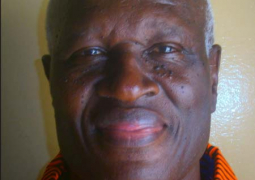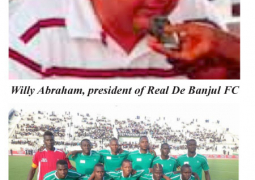More than two hundred and thirty participants from the 11 clusters of Niamina East, Niamina West, Niamina Dankunku and Sotokoi village including the three district Chiefs, Alkalolu, Imams and women leaders have been part of series of community training programmes in the Central River Region South.
This was part of the UNFPA and Gambia Government 2013 funded programme being implemented by the Gambia Committee on Traditional Practices Affecting the Health of Women and Children (Gamcotrap).
Speaking at the various communities, the executive director of Gamcotrap, Dr Isatou Touray, extended her appreciation to all the community and religious leaders present at the training workshops.
She informed participants that Gamcotrap raises awareness on traditional practices to promote and protect the rights of women and children, and has so far done it for many years in different parts of the country.
She emphasised the importance of dialogue and respect for different and diverse opinions, while thanking the UNFPA and the Gambia Government for entrusting Gamcotrap with the responsibility of reaching out to communities in the Niaminas.
Dr Touray informed them that Gamcotrap was not against all traditional practices but only the negative ones that affect women and children.
The Gamcotrap executive director reminded the people that they have to come together to bring about change that would alleviate their difficulties, adding that to sustain the development efforts in the campaign to eradicate FGM, there is need for committed people to sustain the campaign and support their people.
This should not be based on nepotism but on their willingness and commitment to improving the lives of their people, she said, stating that Gamcotrap focuses on improving the sexual and reproductive health and rights of women and children.
“As a right-based organization, we strive to empower communities to make the right choices and follow the best interest of the child, as well as promote positive cultures that respect the dignity of the person,” she asserted.
Dr Touray also appealed to participants to share their knowledge and experience as well as to sensitize others in their cluster communities.
At Kerewan, in Niamina East, Chief Alhajie Kebba Touray thanked the Alkalolu, Imams, women and youth leaders for their presence, and welcomed Gamcotrap in his district.
He noted that many have heard about the work Dr Isatou Touray is leading in The Gambia, saying it was a good opportunity for the area to benefit from the knowledge and information because it is the root of humanity.
Chief Touray referred to a Hadith calling for people to seek knowledge from the cradle to the grave and if need be, seek knowledge even if it means going to China.
He encouraged dialogue to establish truth, knowledge and understanding.
Aja Awa Jawo, a traditional birth attendant from Sinchu Ngundo in Niamina East, said she had accompanied many women to the hospital some of whom had to be operated on before giving birth.
She reported that there were young mothers who even died from complications. She therefore called on all to have sympathy for women and to work together to stop FGM.
Mrs Jawo shared with the participants how her knowledge on FGM empowered her to protect her granddaughters, adding that as a women leader she was aware that Female Genital Mutilation does not determine the religious faith of a woman.
At Pinai, in Niamina West, Chief Ngai Dampha said the training was an opportunity for the participants to ask questions and clarify their doubts.
He noted that it was important to have a clear message to disseminate the right information, emphasising that the primary objective of raising awareness is to improve the health of women.
Chief Dampha informed them that the government is aware of the programme, because it has been going on for a long time and those reached have benefited from the information.
The Niamina West Chief said health has no boundary and they were glad the campaign to eradicate FGM had reached them.
In Niamina Dankunku, ChiefSulayman Keitainformed participants that FGM is a long held practicethat should be re-visited to see if it is on the right path or not.
He informed them that Islam is clear about male circumcision, which has been practised by prophets, “but we have not heard that the wives of prophets were being subjected to FGM, and the Oumou Attiyah Hadith referred to by many of the scholars is a weak Hadith.”
Chief Keita said it is known that FGM causes harm, which is why Gamcotrap is sensitizing people.
He told them about his long-standing support for the campaign to eradicate FGM, saying he was happy the campaign had taken root, and that Gamcotrap was now working in the Niamina, East, West and Dankunku.
He advised that the discussions should not just base on resistance or on the fact that it was a practice they inherited but to take the opportunity to learn from the programme and to improve the lives of women and children.
In Niamina Sotokoi, fifty participants were targeted; however, many more elders and women of reproductive age joined the programme to learn about the effects of FGM.
Like most of the participants from Kerewan Touray, Pinai and Dankunku programmes, the Sotokoi women and men came to the consensus that FGM should stop and they would protect their daughters from the practice.
All the community trainings are aimed at raising awareness and reaching consensus on the eventual dropping of the Knife in the Niaminas to accelerate the abandonment of FGM in The Gambia.
Meanwhile, thirty male and female participants representing the 107 villages of the three Niaminas are the target of the three-day training in Kudang to build their capacity as Community-Based Facilitators.
The training would empower them on community participation, rights-based approach to addressing traditional practices and gender-based violence, as well as advocacy skills using different media.
The objective was to empower them to sustain the campaign in their various cluster communities and serve as focal persons who would facilitate the flow of information.



